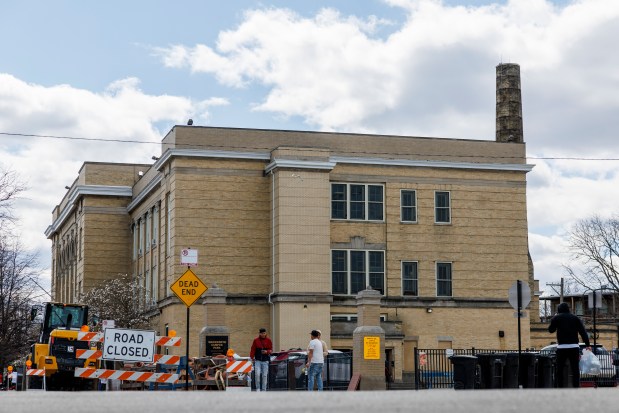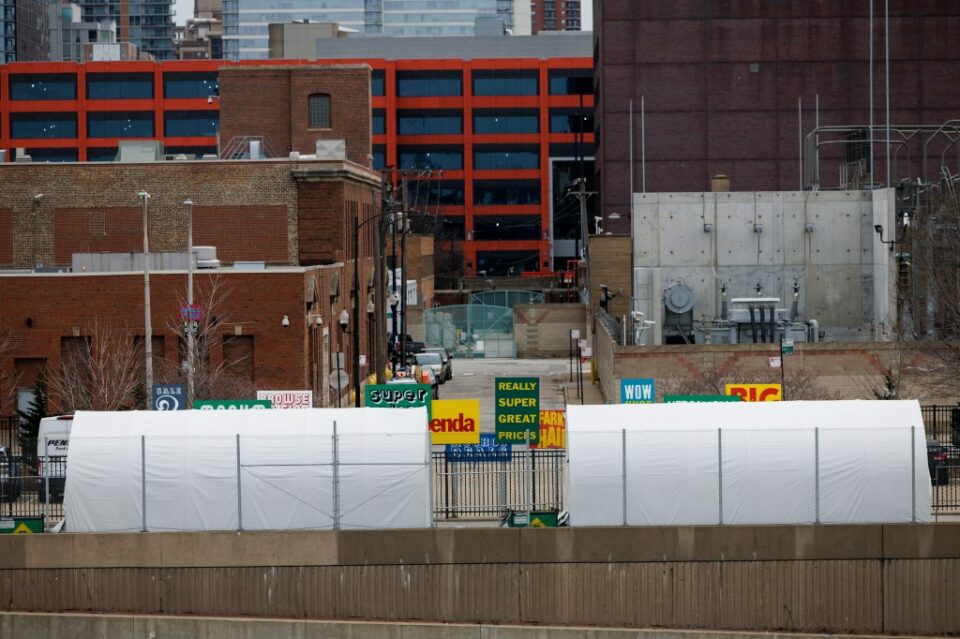After months of postponing shelter evictions for migrants, Mayor Brandon Johnson doubled down last week on Sunday’s deadline to remove migrants who had surpassed the 60-day limit.
The result? Just three of the 11,000 shelter residents were evicted Sunday.
Outside of shelters, migrants and volunteers who had set up tables to help those being removed expressed confusion at the lack of evictions and were left with unanswered questions.
At a Friday briefing with reporters, city officials said 34 migrants were scheduled to leave Sunday. The adults were slated to be evicted from three different migrant shelters.
But officials said Monday four were exempted because of disability and pregnancy. The other 27 were awaiting benefits from the state for housing or other protections.
Johnson’s deputy chief of staff Cristina Pacione-Zayas told the Tribune that the small number of evictions was not a “slight of hand” after the eviction announcements, but rather a response to an ever-evolving and “fluid” situation.
City officials say that coffers for sheltering migrants are running out, and closing shelters is a sure-proof way to save costs. But Johnson has delayed enforcing his shelter limit policy three times now, facing consternation from advocates who say thousands of migrants — many sent to Chicago on buses by Texas Gov. Greg Abbott — have few other housing options.
“What we can say today can easily change tomorrow if we get eight buses,” Pacione-Zayas said. “We prepared for 34 exits, and there were only three.”
On Friday, Johnson’s administration exempted about 4,500 migrants who were set to be evicted from the shelter system this spring.
Pacione-Zayas said though she knows that it is important to publicly share the reasons for exemptions, she wants to be careful with migrants’ personal information.
“Sometimes it can be an imposition on them. They’re going through what they’re going through,” she said. “This is not a zoo.”
Exemptions will be determined on a case-by-case basis for people with medical issues, who are in the process of leaving Chicago or securing housing, or who need to quarantine, according to officials. Pregnant women are exempt, and families with children can now receive three 30-day extensions.
That leaves around 2,000 people — mostly men — to be evicted in waves by the end of April. To be sure, the process is slow, and officials say it will likely have more visible effects in the coming weeks and months.
The city did not say how many people exited shelters Monday. Many migrants say their eviction date isn’t for several weeks.
Ald. Andre Vasquez, 40th, said Sunday he hasn’t been provided any information by city officials about many migrants will be evicted out of which shelters in the next few days. As chair of the city’s Immigration Committee, he said having accurate census numbers is important to prevent homelessness and crime.
“What would you do? If you didn’t have a place to live or any means to survive?” he asked.

The 34 adults slated for eviction were at the Woodlawn shelter at the former Wadsworth Elementary School, the Gage Park fieldhouse on the Southwest Side and a building on North Elston Avenue in West Town.
To prepare for their removal, several volunteers set up a table outside the shelter in Woodlawn on Sunday. They set out sandwiches wrapped in plastic and bags of toiletries for migrants who had supposedly reached their time limit inside.
But no migrants had left by the 2 p.m. deadline city officials touted at the briefing last week. So volunteers packed up their tables.
About a dozen men stood outside and said they’d been told by staff that the shelter was closing soon.
“This is just the way life is for us,” said Moises Lopez, 21, when asked about the looming eviction notices. “The uncertainty. It’s not easy. There are many people who can’t work, and we don’t know what we’re going to do.”
Most migrants don’t qualify for work permit authorization, which would give them the right to legally work in the United States. Advocates say not having the document is a large barrier to migrants’ autonomy and economic independence.
Having received thousands of migrants on buses in the middle of winter, Johnson previously cited inclement weather as a reason to allow people to stay in shelters. Then in recent days, a large measles outbreak at a shelter on the Lower West Side contributed to the thousands of additional exemptions, officials said.
Jaime Groth Searle, founder of Southwest Collective, said the administration has flip-flopped its policy so many times that migrants aren’t actually prepared to be asked to leave.
“It’s a little bit of a surprise when they are told,” she said. “They have to start all over again.”
Yorladis Reneteria, who stood outside the fieldhouse in Gage Park with her husband, Aldo Reyes, Sunday morning said her eviction date wasn’t until April 30. Reneteria didn’t know of anyone inside who was leaving Sunday.
“The city keeps changing their mind. I don’t have kids, but I imagine it’s just that much more scary for the families that do,” she said.
Denver and New York have also received thousands of migrants in recent months and are adopting similar shelter limits, despite espousing welcoming values before Abbott’s busing program began.
Chicago officials said migrants who are evicted can find their way back to the city’s “landing zone” in the West Loop, where they can reapply for the shelter system if they want a bed.
No migrant interviewed by the Tribune Sunday knew how to get to the landing zone, though they’d heard it was an option.
Jesus Jimenez, 24, said Monday he didn’t know how the shelter was enforcing shelter limits. It was his 60th day at the shelter in West Town, but he hadn’t received a warning to leave.
“I don’t know what’s going on,” he said. “I think they’re supposed to tell us 10 days before we need to go.”
But Jimenez said he was glad the city wasn’t asking him to leave that afternoon. He said he wanted to be connected with resources and find a steady job first.
Chicago Tribune’s Alice Yin contributed.
Nell Salzman , 2024-03-19 00:44:06
Source link


